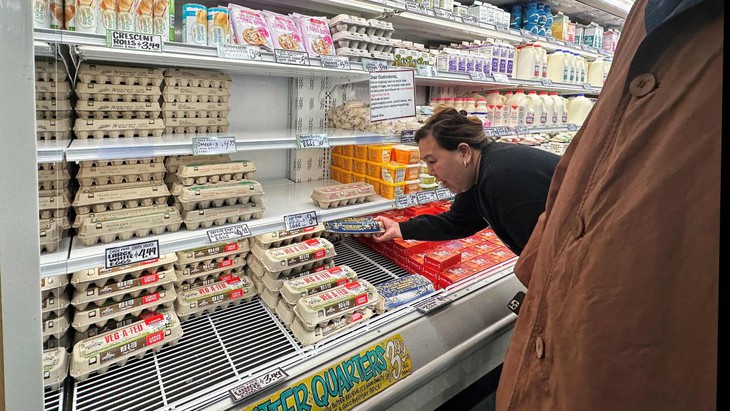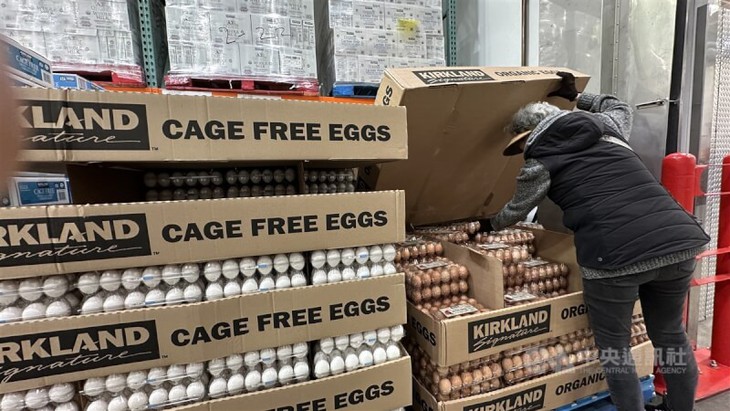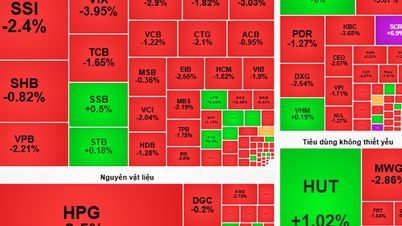
Customers buy eggs at a supermarket in Pasadena (USA), with a sign limiting the number of purchases posted on the shelf - Photo: AFP
According to the Italian newspaper Corriere della Sera on March 18, the US has contacted Denmark, Germany, Spain, France, the Netherlands and Italy to discuss the possibility of importing eggs, in order to reduce pressure on the domestic market due to the bird flu epidemic.
Italy and Germany find it difficult to "save" the US
Accordingly, the US Embassy has worked with the Italian Meat and Egg Industry Association (Unaitalia) to assess the possibility of exporting eggs to the US in the coming months.
However, Unaitalia Director General Lara Sanfrancesco said that Italy's egg production is mainly for domestic consumption and is not enough to export to the US. She stressed that Italy is not a country with a large egg exporting capacity, so it is difficult to provide significant support to the egg crisis in the US.
CNA (Taiwan) news agency reported on March 19 that US producers and intermediaries were forced to buy eggs on the spot market because committed orders could not be delivered on time.
In Germany, President of the German Egg Association (BVEi) Hans Peter Goldnick confirmed to public broadcaster ARD that the country had received a request from the US regarding egg exports.
However, Mr. Goldnick said the rate of egg exports to the US is still very limited due to many reasons, the main reason being the priority of domestic consumption, similar to the situation in Italy.
According to CNA , statistics for 2023 show that 73% of eggs consumed in Germany are produced domestically, while the rest must be imported to meet domestic demand.
Risk from unquarantined eggs
According to the Wall Street Journal (WSJ), egg prices in the US have skyrocketed, causing many people to try to buy eggs from Mexico and Canada. However, the US Department of Agriculture (USDA) has banned people from importing eggs themselves due to concerns about the risk of spreading disease from unsanitary eggs.
The number of eggs seized in the current fiscal year has increased 36% compared to the previous year, especially in border areas such as San Diego and Texas, according to US Customs and Border Protection (CBP).
Europe may also face egg shortages.
The US egg crisis was largely caused by the H5N1 avian influenza outbreak, which led to the culling of millions of egg-laying hens, causing severe disruptions to the supply chain.
The shortage is not just affecting the US, but also the egg supply chain in Europe. However, there is a significant difference in egg prices between the two regions.
According to CNA, the price of a dozen eggs in the US can be up to 10 USD (about 250,000 VND) or even higher, while in Italy the average price of eggs in a supermarket chain in Rome is only about 4.5 euros (about 125,000 VND). Although the price of organic eggs or eggs from small farms can be higher, they are still significantly lower than the price in the US.

European experts call for protecting egg reserves from the impact of bird flu - Photo: CNA
In addition to Italy and Germany, suppliers in Sweden also expressed concerns that even without political factors, overcoming the egg shortage would still face many obstacles due to strict export regulations and transatlantic shipping conditions.
At the same time, demand for eggs in Europe continues to increase as the Easter season approaches, adding to pressure on the region's supply chain.
Egg prices hit a record high in the 10th week of 2025, forcing producers to protect stocks to mitigate the impact, as chickens in the region have also been affected by bird flu, according to the German Egg Distribution Union (DEU).
Source: https://tuoitre.vn/thieu-trung-tram-trong-my-cau-cuu-duc-va-y-20250319181032375.htm




![[Photo] Science and Technology Trade Union honors exemplary workers and excellent union officials](https://vphoto.vietnam.vn/thumb/1200x675/vietnam/resource/IMAGE/2025/9/17/842ff35bce69449290ec23b75727934e)
![[Photo] General Secretary To Lam chairs a working session with the Standing Committee of the Government Party Committee](https://vphoto.vietnam.vn/thumb/1200x675/vietnam/resource/IMAGE/2025/9/17/cf3d855fdc974fa9a45e80d380b0eb7c)





























































































Comment (0)